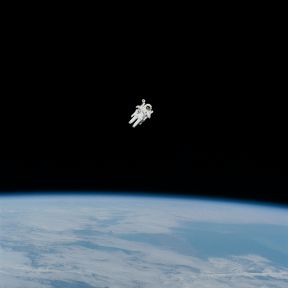RESILIENCE- What Astronauts Can Teach Us About Resilience. An interview with Chris Hadfield.

KEY POINTS
- By traveling to outer space, astronauts explore the frontiers of human resilience.
- Among key competencies for navigating the stress of spaceflight are teamwork and adaptability.
- A sense of connection, to yourself and to others, is vital for well-being.
Here’s a thought experiment. Imagine floating in an edgeless expanse of darkness outside the International Space Station. The blue Earth, teeming with life and all you ever loved, is glowing peacefully underneath you. Suddenly, you are jolted by a startling realization: You are finally on your highly-anticipated spacewalk and you are going blind.
What would you do?
When astronaut Chris Hadfield found himself in this wildly improbable scenario, he turned it into an opportunity to explore the frontiers of human resilience and return home with one breathtaking story.
Being an astronaut is among the hardest jobs in the world. Much goes into the months and years before those familiar images of fellow humans enjoying the curious realities of leaving the gravitational embrace of home actually occur (surprisingly, it takes only 8 minutes and 42 seconds to reach weightlessness).
Once selected (out of 20,000 applicants, NASA typically takes 10), astronauts begin round-the-clock training. The goal? To be prepared for anything. This requires not only an intimate understanding of the technology that will keep them alive in space but also the far more complex psychology of the humans operating the technology.
What extraordinary competencies help astronauts successfully navigate the stress and uncertainty of spaceflight? It turns out to be the same ones that help us manage the ordinary plights of life on earth. According to psychologist Suzanne Bell, who leads the Behavioral Health and Performance Lab at NASA, these include mental and physical self-care, teamwork, emotion regulation, and adaptability, which is “a trait, a process, and an outcome that allows people to survive and thrive in whatever circumstance comes their way and the ability to do so with a long-term orientation.”

Here’s Chris Hadfield—an astronaut of 21 years, a musician (his rendition of David Bowie’s "Space Oddity," which he filmed in space, has been viewed over 75 million times), a bestselling author (his latest book is The Defector)—on what space travel taught him about being human.
How did traveling in outer space impact your inner space?
No matter where you were born on Earth, your knowledge is local. Even if you travel a lot, you only see a small percentage of the surface of our world. Sometimes, we can get beyond our parochial view of the planet and ourselves by looking at the stars in the sky.
One of the largest impacts of leaving the Earth is that you get to see it in context. As astronauts, we separate ourselves from the world and see it as one discrete place against the blackness of the universe, while experiencing the perspective of distance and time. This can be profound.
Space travel gave me a better perception of the incredible age of the world. When you go around the world in 90 minutes, you see the continents as entities that used to fit together. Suddenly, you get a visceral, unfiltered sense of what 4 1/2 billion years might be.

Despite having withstood tremendous events in the past, the Earth has sustained uninterrupted life for 3 1/2 billion years. It’s still here, thriving, beautifully blue against the darkness. It’s not going anywhere, because life has proven to be far tougher than we can imagine. This realization is immensely optimism-building.
Furthermore, seeing the flickering lights beneath leaves you with a sense of the commonality of human existence. From above, our patterns of settlement and behavior are remarkably similar no matter where you go. That’s reassuring—despite our magnified differences, we are a bunch of the same thing in a bunch of different locations, trying to live our lives.
What are among the biggest insights that you came back to Earth with?
One: We are responsible for our own future, individually and collectively. Everything else is a gift. It’s up to us whether we are terrific or terrible stewards of this Garden of Eden that we’ve been handed. Our choices matter, including how we, as individuals, use our influence to take care of this particular moment in history.
Two: Life is likely common in the universe. But intelligent life—the kind that requires a certain measure of organization, self-awareness, ability for reasoning, and intellect necessary to build a civilization that we’ve had for the past 10,000 years—is probably exquisitely rare. This, again, puts a great burden of responsibility onto each of us to not squander it all due to our short-sightedness, because it took 4 1/2 billion years for enough random events to occur for us to evolve.
What are your top skills for nurturing resilience?
To me, the opposite of resilience is the inability to survive. In that view of resilience, three things are important.
One is a willingness to do the work, to dig into what needs to get done. Two is perpetual curiosity—a readiness to learn new things and to make them a part of who you are. Complacency about your own abilities can decrease your resilience. Three is recognizing that you’ll never have all the answers to everything. Thus, the ability to work well with others in pursuit of a common goal is essential.
What do you know about happiness now that you didn’t know before?
Happiness is almost always a choice. It’s important to try and allow yourself to feel victorious, accomplished, and joyful as many times per day as possible.
Nobody cares or understands what you’re doing nearly as much as you do—so get over it. Relax. Stop waiting for external validation. Recognize that your happiness is up to you. If you’re waiting for someone else to make you happy, you’re going to be unhappy your whole life.
How important for success is the sense of connection—to yourself, to others, to the world?
I think the most important connection that you need to make is the one with yourself. You can regularly absolve yourself of that by shuffling through life and not getting involved with the choices that determine important outcomes. To have a sense of purpose in your decision-making is vital to mental health. And that comes down to a connection with yourself.
An important part of internal connection is being honest and clear with yourself (What am I trying to accomplish? What is my purpose in life? What does success look like? What is joy?) and having respect for yourself. If you don’t have these things, the rest will likely fail.
There are various ways one can get in tune with themselves. For example, if I have five minutes to myself, I take that time to center and to micro-meditate, to get rid of the noise, to find peace and grace.
At the same time, for most of us, meaning, happiness, and success are often wrapped up in other people. Thus, our connection with others is key to our well-being.
For example, among my most joyful moments is when I’m playing music with others and I realize that as our sounds merge, we are creating a communication that otherwise couldn’t exist. We can even arouse a range of emotions simply by altering how we play our instruments or use our voices. Similarly, in all our communication with others, we are continuously creating a particular type of music together.
As for being connected to the world, I’ve been around the planet 2,600 times. It doesn’t matter where I’m standing today. This is home.
- Questions and Answers
- Opinion
- Story/Motivational/Inspiring
- Technology
- Art
- Causes
- Crafts
- Dance
- Drinks
- Film/Movie
- Fitness
- Food
- Игры
- Gardening
- Health
- Главная
- Literature
- Music
- Networking
- Другое
- Party
- Religion
- Shopping
- Sports
- Theater
- Wellness
- News
- Culture
- War machines and policy

